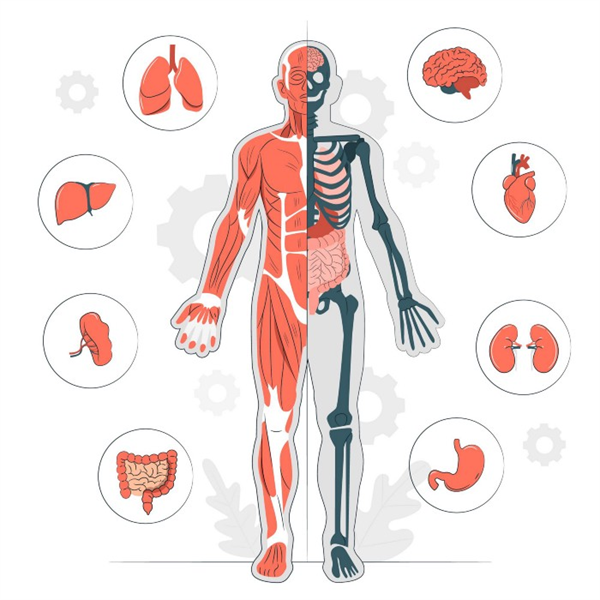How Alcohol Damages Various Bodily Systems
Current research shows that even lower doses of alcohol still have a detrimental effect on our health

I’m a former nurse and recovering alcoholic, and I have been sober from alcohol for five and a half years. After moving through recovery and reflecting on how alcohol damaged my health, I’m committed to providing education for those who want to know more about how alcohol affects various bodily systems.
This education is not always easy to find, which is why most people don’t realize how alcohol is affecting their body or their health. Current research also shows that even lower doses of alcohol still have a detrimental effect on our health. My goal is to help people know the correct information so they can make better decisions about their alcohol use.
Learn how various bodily systems are impacted by alcohol use.
Brain and Nervous System
The brain and nervous system are probably the most affected by alcohol use. All other bodily systems are directly influenced by the brain and nervous system and can all be under the same umbrella. However, they each have some specific issues as well, which is why I have separated them out.
Recent research shows that even low-dose alcohol can affect the grey matter of the brain. This is the part that helps us control our movement, memory, and emotions. These are pretty important functions for our daily life.
In higher doses, alcohol can wreak havoc on the nervous system. It causes alterations in how our nerve messages are transmitted, which affects the whole body. Over time, the nervous system becomes primed for over-excitation, which plays a part in severe withdrawal symptoms. Also, through a process called neuroplasticity, our nervous system can become so used to using alcohol that it becomes challenging to quit or cut down. Pretty soon, it all becomes a vicious cycle of needing more alcohol to feel normal. But the heavy use of alcohol continues to damage the brain and neurons.
Kidneys
Alcohol changes the way the kidneys function almost immediately after drinking. It causes changes in hormones that monitor the fluid level in the body, which causes increased urination and dehydration. Alcohol also makes the kidneys less able to filter the blood properly, which is perhaps the worst outcome of alcohol use on the kidneys. This means that small amounts of toxins may stay in the body, causing a person to feel sick or moderately not well.
Pancreas
The pancreas is a digestive organ that helps us break down and process food. When we drink alcohol, pancreatic cells metabolize it into toxic byproducts that can damage the pancreatic ducts, where enzymes are released into the stomach. This means that pancreatic enzymes remain inside the pancreas and begin to digest the pancreas itself. This can lead to pain, nausea and digestive problems. If alcohol intake is very high, it can cause pancreatitis, which can be life-threatening. However, alcohol acts upon the pancreas even in low doses, causing some irritation.
Skin
Many people likely know that alcohol can cause reddening of the facial skin. This is due to dilation in blood vessels bringing blood to the surface of the skin. However, over time, this can cause permanent damage and scarring of the skin. Also, the inflammatory nature of alcohol can cause the skin to swell and look puffy. This effect can happen even at low doses. Due to the inflammation, alcohol can also cause more incidents of cystic acne.
Skin changes can also occur with more severe alcohol use that damages other organs, namely the liver. In this case, a condition called spider angiomas can occur on the face and chest and is a serious sign of liver issues. These angiomas look like small red spiderwebs and are permanent.
Heart
Alcohol works in combination with the nervous system to negatively impact the heart. Alcohol can cause an increase in issues like tachycardia (fast heartbeat) and heart rhythm issues that can be dangerous for people with existing heart and blood pressure issues. Alcohol also raises blood pressure, which may not be significant for someone with normal blood pressure, but can be dangerous for someone with cardiovascular problems.
For a heavy drinker with potential liver problems, portal hypertension (increased blood above the liver) can put severe pressure on the heart, causing dangerous blood pressure and potential bleeding issues.
Digestive System
Alcohol, even in low doses, can upset the stomach and intestines. It can also disrupt the absorption and processing of nutrients. Alcohol raises stomach acid levels, which can give rise to ulcers in the stomach and small intestine. The regular use of alcohol has been linked to esophageal, stomach and intestinal cancers. Lastly, alcohol causes significant problems with the gut microbiome, which may have severe consequences for food absorption, immune system issues and gut motility.
Liver
Alcohol at high doses taken over a long period of time can cause alcoholic liver disease. But even at lower doses, alcohol can slow down the functioning of the liver, which can cause some vague and uncomfortable symptoms. Even moderate use of alcohol can cause liver cell death. Oddly, the signs of alcoholic liver problems are outside of the liver and occur in other parts of the body — you can read more about that here.
The more that people understand the actual effects of alcohol on their health, the better they can make decisions about alcohol use. Most people don’t realize that alcohol is a dangerous and toxic drug even though it’s legal and widely available.
Doctors encourage patients to stay within the safe drinking guidelines (one drink per day for a woman and two drinks per day for a man) but rarely educate them on the myriad health issues that arise at high or low doses.
More Help & Information
Sobriety vs. Recovery: What's the Difference?
Are the concepts themselves up for debate? Do they require certain treatments, or abstinence from everything? It's complicated! And new ways of thinking are changing the conversation.
Now Elite NFL Players, They First Tackled Addiction | News Roundup
All Sober compiles the best of the latest headlines. Here's your addiction and recovery news for the week of Feb. 19, 2024!
Help Them Help You: Explaining Your Mental Health to Your Family
Your mental health can affect — and be affected by — your loved ones. Here's how to discuss it with them so everyone can heal.
Dry January (and Beyond): The Possibilities Are Endless
There's never been a better time to go sober. Whether you're trying it out this month or already living the life, join us for some tips, ideas, inspiration — and maybe even new friends.
Sober Holiday Tips: Meeting 'Share-a-Thons'
Need to get out of the house for a bit and see some friendly sober faces? Recovery support group meeting marathons run 24/7 from Christmas Eve through New Year's Day.
What Happens After an Intervention?
Your loved one agreed to get treatment for addiction during their intervention — or not. Here's what you need to know about what comes next.
We're in This Together: Building a Healthy Sober Support Network
You are the captain of your recovery, but you don't have to do it alone. A sober support network will lift you up in tough times and celebrate your triumphs.
Real-Life Recovery Tips: Phone a Friend
When you're traveling, you can take your sober support network with you — right in your pocket. Rocker Kasim Sulton shares his top recovery tip in this video.











